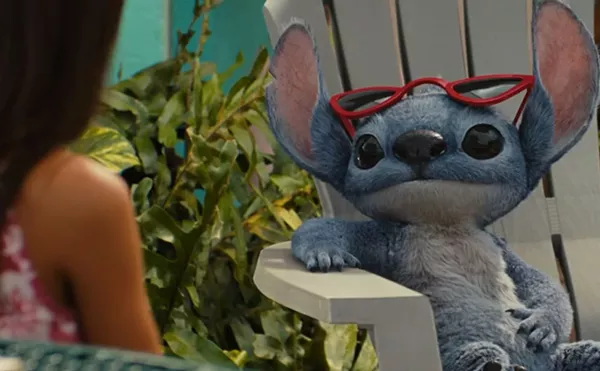
Audio By Carbonatix
[
{
"name": "GPT - Leaderboard - Inline - Content",
"component": "35519556",
"insertPoint": "5th",
"startingPoint": "3",
"requiredCountToDisplay": "3",
"maxInsertions": 100,
"adList": [
{
"adPreset": "LeaderboardInline"
}
]
}
]
One thing you can say in favor of Lasse Hallström’s Chocolat is that it begins with a fair warning — when a movie starts out with the words “once upon a time,” it’s asking for the viewers’ indulgence, if not their forgiveness.
This, we are being signaled, is going to be a sort of fairy tale, with much cuteness and whimsy, and villainous villains and really good good people. Plot turns will be seen coming a mile away and the happy ending is a foregone conclusion. It’s like listening to a blues song — you know the drill and the only question is whether or not it’s well done and if any sort of personality is brought to the old changes.
Chocolat takes place around 1960 in a small French village where everybody speaks English, in a variety of accents, most predominantly British. It’s a very uptight little town, a bastion of strict Catholicism and bourgeois piety, lorded over by its ostentatiously repressed mayor, Comte de Reynard (Alfred Molina). To counter this specificity of time and place Hallström films his village through a gauzy lens, coating its late-mediaeval architecture with a dreamy fuzz. It may be France 40 years ago, but it’s also never-never land, and now you’ve been warned both verbally and visually.
One day the catalyst to the plot, a single mother named Vianne (Juliette Binoche), arrives in this sour precinct and proceeds to open a chocolate shop, a rather exotic one whose main delicacy is a cup of hot Mayan chocolate with a pinch of chili power (hmmm, boy). This is the main conceit of the film: that chocolate is not just the mood-altering sweet that we all know and crave beyond reason, but also a liberator of the essential life force as well as a powerful aphrodisiac. The townspeople are both alarmed by and drawn to Vianne’s shop and slowly she wins them over by turning them into degenerate chocoholics.
This winning over of the townspeople is done as a series of vignettes, giving little turns to the likes of Peter Stormare, Judi Dench and Lena Olin, and after the film dawdles on in this manner for an hour or so a nagging question burbles to the surface of the viewer’s drowsy mind: Isn’t Johnny Depp suppose to be in this? And sure enough he arrives like Harry Lime, late at the feast and exuding Special Guest Star charisma and adding a cool Irish accent to the babble of tongues.
With Vianne’s love interest in place, can the transformation of the mayor be far behind? OK, so it’s not a suspense film. Unfortunately, flat and predictable, well-filmed but desperate to please, it’s not much of a fantasy either.
E-mail Richard C. Walls at letters@metrotimes.com.





